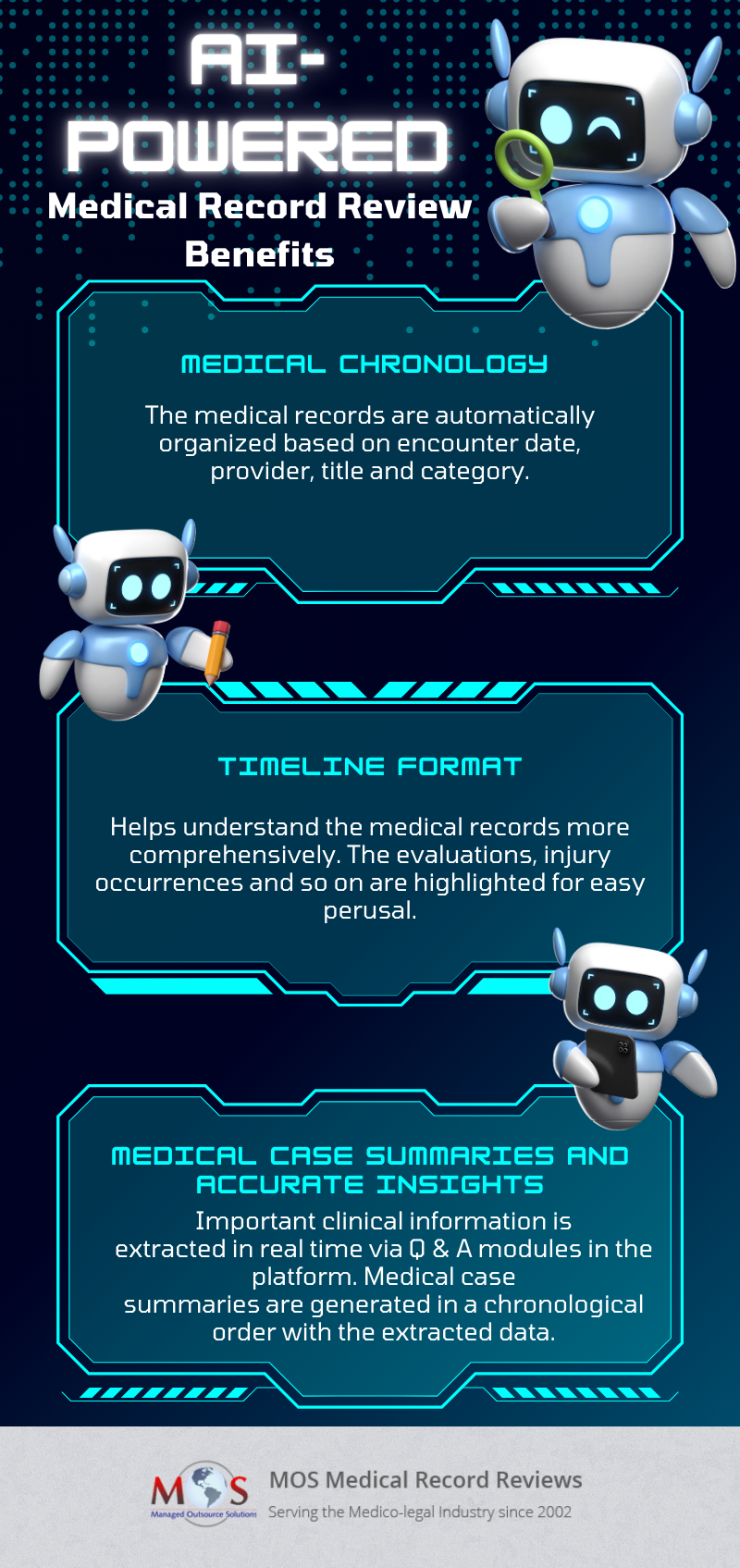Workers’ compensation claims are often challenging due to many reasons. There are stringent regulations to consider, which may be different in different states. Another major concern is the risk of fraud, that leads to increased healthcare costs and other hassles. The medical records associated with a claim can be hundreds or even thousands, which makes the review process quite tedious and time-intensive. However, now AI adoption in the insurance sector is bringing about a welcome change in this field, providing effective solutions to various concerns. Medical record review for attorneys in the insurance and workers’ compensation sectors has also become quicker and more efficient.
MOS Medical Record Reviews provides quick and timely medical chart review for insurance attorneys.
Medical Records Analysis Made Easier and More Efficient
AI models used for reviewing medical records are customized to meet the individual requirements of lawyers, insurers and independent medical evaluators who need to manage voluminous medical records. These tools extract important insights from all types of healthcare records.
- Key clinical data related to diagnoses, treatments, prognoses and medical history is extracted from complex medical records so that customizable summaries can be created in real time. Generative AI models ensure unbiased summarization, minimal errors and optimized workflow with proper medical record organization based on date, content, and relevance.
- The medical data is presented chronologically so that users can search and filter without any hassles.
- The condensed format of medical information helps with quick comprehension and informed decision making.
- AI-powered medical record review is the fastest way to process unstructured medical data. It speeds up research and by promoting data-driven decision making, it helps with belter outcomes.
Advantages for the Workers’ Compensation System
Workers’ compensation claims are processed using a large amount of data or information including those related to the injury as well as those pertaining to associated state requirements. Advanced AI tools can easily evaluate such data as well as those related to the communications between a claims adjusting team and an injured worker. Such reviews provide valuable insights regarding the worker’s sentiment. This data is used to predict litigation risk. How? If the sentiment is negative, the chances of litigation are more, and if it is positive, the risk of litigation is less. Awareness of the litigation risk can assist the employer in adopting the right approach to the claim.
Injury care evaluation in workers’ comp must be properly done to prevent delays in receiving insurance authorizations and appropriate care. When different healthcare providers give varying diagnoses and treatment plans for similar injuries, it often leads to inconsistencies and delays in claims processing. Apart from prolonging the workers’ compensation process, such issues could hinder recovery from the injury. Here, AI-driven medical record analysis can help address the challenges. Since AI and machine learning algorithms can easily and efficiently analyze vast amounts of patient data, the review process is very quick. Moreover, advanced AI tools can spot trends and patterns that human evaluators may fail to identify. Predictive analytics based on hundreds of thousands of patient records and workers’ compensation claims help forecast the outcomes of injuries and recovery details.
Another important use of AI is in understanding the time to reach maximal medical improvement (MMI). Typically, this assessment varies widely depending on the affected body part or system, job duties and geographical location. This is challenging when it comes to setting realistic and achievable recovery goals for the injured worker. Also, the recovery rates can vary based on the availability of medical care in different geographic locations and its quality. AI tools can study data from historical cases and spot the key factors that affect recovery timelines. More accurate predictions are provided by considering geographic and occupational variables.
AI tools review data from earlier similar injuries to predict the time it may take the injured worker to achieve MMI, considering also their specific job duties and geographic location. This data is vital in setting realistic and achievable target recovery goals. It also helps insurers and employers to develop customized and effective recovery plans and allocate the resources appropriately.
The next significant advantage offered by AI-powered medical record review services is in determining accurate settlement pricing. Here again, the tools evaluate historical settlement data and use predictive models to project future care costs. In this, factors such as the nature of injury, the body system that is affected, historic treatment costs and so on are analyzed to arrive at an accurate pricing. When the financial evaluations are accurate and fair, there is lesser likelihood of disputes and quicker claim resolution.
In the course of time, AI and machine learning tools will continue to improve and become more accurate and efficient. Alongside, the ability of AI technology to predict risks will also improve. Companies providing medical records services for workers’ compensation insurers will also be able to provide better and quicker solutions. In short, all stakeholders stand to benefit in terms of improved outcomes and efficiencies from the use of AI in workers’ compensation.
Contact MOS today for customized AI-powered medical records services.





